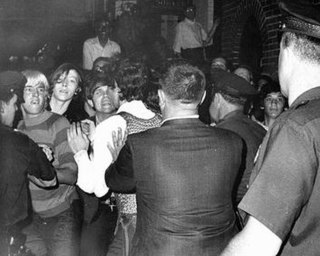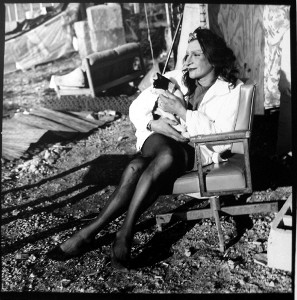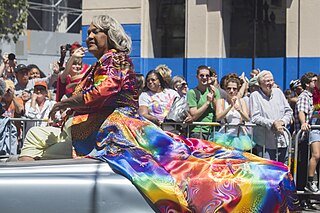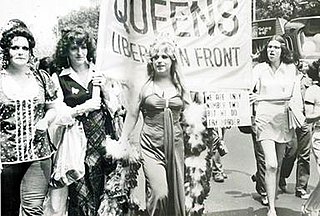
The Stonewall riots, also known as the Stonewall uprising, Stonewall rebellion, or simply Stonewall, were a series of protests by members of the LGBTQ community in response to a police raid that began in the early morning hours of June 28, 1969, at the Stonewall Inn in the Greenwich Village neighborhood of Lower Manhattan in New York City. Patrons of the Stonewall, other Village lesbian and gay bars, trans activists and unhoused LGBT individuals fought back when the police became violent. The riots are widely considered the watershed event that transformed the gay liberation movement and the twentieth-century fight for LGBT rights in the United States.
The word cisgender describes a person whose gender identity corresponds to their sex assigned at birth, i.e., someone who is not transgender. The prefix cis- is Latin and means on this side of. The term cisgender was coined in 1994 as an antonym to transgender, and entered into dictionaries starting in 2015 as a result of changes in social discourse about gender. The term has been and continues to be controversial and subject to critique.

Gay Liberation Front (GLF) was the name of several gay liberation groups, the first of which was formed in New York City in 1969, immediately after the Stonewall riots. Similar organizations also formed in the UK, Australia and Canada. The GLF provided a voice for the newly-out and newly radicalized gay community, and a meeting place for a number of activists who would go on to form other groups, such as the Gay Activists Alliance, Gay Youth New York, and Street Transvestite Action Revolutionaries (STAR) in the US. In the UK and Canada, activists also developed a platform for gay liberation and demonstrated for gay rights. Activists from both the US and UK groups would later go on to found or be active in groups including ACT UP, the Lesbian Avengers, Queer Nation, Sisters of Perpetual Indulgence, and Stonewall.

Transfeminism, or trans feminism, is a branch of feminism focused on transgender women and informed by transgender studies. Transfeminism focuses on the effects of transmisogyny and patriarchy on trans women. It is related to the broader field of queer theory. The term was popularized by Emi Koyama in The Transfeminist Manifesto.

Jean O'Leary was an American lesbian and gay rights activist. She was the founder of Lesbian Feminist Liberation, one of the first lesbian activist groups in the women's movement, and an early member and co-director of the National Gay and Lesbian Task Force. She co-founded National Coming Out Day.

Marsha P. Johnson was an American gay liberation activist and self-identified drag queen. Known as an outspoken advocate for gay rights, Johnson was one of the prominent figures in the Stonewall uprising of 1969.

Sylvia Rivera was an American gay liberation and transgender rights activist who was also a noted community worker in New York. Rivera, who identified as a drag queen for most of her life and later as a transgender person, participated in demonstrations with the Gay Liberation Front.
Street Transvestite Action Revolutionaries (STAR) was a gay, gender non-conforming and transvestite street activist organization founded in 1970 by Sylvia Rivera and Marsha P. Johnson, subculturally-famous New York City drag queens of color. STAR was a radical political collective that also provided housing and support to homeless LGBT youth and sex workers in Lower Manhattan. Rivera and Johnson were the "mothers" of the household, and funded the organization largely through sex work. STAR is considered by many to be a groundbreaking organization in the queer liberation movement and a model for other organizations.

LGBT movements in the United States comprise an interwoven history of lesbian, gay, bisexual, transgender and allied social movements in the United States of America, beginning in the early 20th century. A commonly stated goal among these movements is social equality for LGBT people. Some have also focused on building LGBT communities or worked towards liberation for the broader society from biphobia, homophobia, and transphobia. LGBT movements organized today are made up of a wide range of political activism and cultural activity, including lobbying, street marches, social groups, media, art, and research. Sociologist Mary Bernstein writes: "For the lesbian and gay movement, then, cultural goals include challenging dominant constructions of masculinity and femininity, homophobia, and the primacy of the gendered heterosexual nuclear family (heteronormativity). Political goals include changing laws and policies in order to gain new rights, benefits, and protections from harm." Bernstein emphasizes that activists seek both types of goals in both the civil and political spheres.

A transgender person is someone whose gender identity differs from that typically associated with the sex they were assigned at birth. Some transgender people who desire medical assistance to transition from one sex to another identify as transsexual. Transgender is also an umbrella term; in addition to including people whose gender identity is the opposite of their assigned sex, it may also include people who are non-binary or genderqueer. Other definitions of transgender also include people who belong to a third gender, or else conceptualize transgender people as a third gender. The term may also include cross-dressers or drag kings and drag queens in some contexts. The term transgender does not have a universally accepted definition, including among researchers.

This article addresses the history of transgender people in the United States from prior to Western contact until the present. There are a few historical accounts of transgender people that have been present in the land now known as the United States at least since the early 1600s. Before Western contact, some Native American tribes had third gender people whose social roles varied from tribe to tribe. People dressing and living differently from the gender roles typical of their sex assigned at birth and contributing to various aspects of American history and culture have been documented from the 17th century to the present day. In the 20th and 21st centuries, advances in gender-affirming surgery as well as transgender activism have influenced transgender life and the popular perception of transgender people in the United States.

Miss International Queen is the world's biggest beauty pageant for transgender women. The pageant was conceived in 2004 and named the largest and most prestigious by CNN original American documentary television series This Is Life with Lisa Ling aired on 26 November 2017.
Feminist views on transgender topics vary widely.
Transgender studies, also called trans studies or trans* studies, is an interdisciplinary field of academic research dedicated to the study of gender identity, gender expression, and gender embodiment, as well as to the study of various issues of relevance to transgender and gender variant populations. Interdisciplinary subfields of transgender studies include applied transgender studies, transgender history, transgender literature, transgender media studies, transgender anthropology and archaeology, transgender psychology, and transgender health. The research theories within transgender studies focus on cultural presentations, political movements, social organizations and the lived experience of various forms of gender nonconformity. The discipline emerged in the early 1990s in close connection to queer theory. Non-transgender-identified peoples are often also included under the "trans" umbrella for transgender studies, such as intersex people, crossdressers, drag artists, third gender individuals, and genderqueer people.

The following outline offers an overview and guide to LGBT topics.

Queens Liberation Front (QLF) was a homophile group primarily focused on transvestite rights advocacy organization in New York City. QLF was formed in 1969 and active in the 1970s. They published Drag Queens: A Magazine About the Transvestite beginning in 1971. The Queens Liberation Front collaborated with a number of other LGBTQ+ activist groups, including the Gay Activists Alliance and the Street Transvestite Action Revolutionaries.
Mirha-Soleil Ross is a transgender videographer, performance artist, sex worker and activist. Her work since the early 1990s in Montreal and Toronto has focused on transsexual rights, access to resources, advocacy for sex workers and animal rights.
Beth Elliott is an American trans lesbian folk singer, activist, and writer. In the early 1970s, Elliot was involved with the Daughters of Bilitis and the West Coast Lesbian Conference in California. She became the centre of a controversy when a minority of attendees in the 1973 Conference, including a keynote speaker, called for her removal because of her trans status.
Demet Demir is a Turkish LGBT activist. She was awarded the Felipa de Souza Award in 1997 for her activism.

Come Out! was an American LGBT newspaper that ran from 1969 to 1972. It was published by the Gay Liberation Front (GLF), a gay liberation group established in New York City in 1969, immediately following the Stonewall riots. The first issue came out on November 14, 1969, it sold for 35 cents, and 50 cents for outside of New York City. Its run only lasted for eight issues. Its tagline for the first paper was: "A Newspaper By And For The Gay Community".












